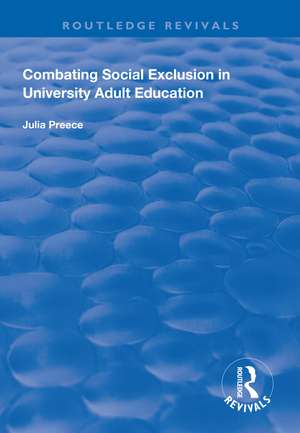Combating Social Exclusion in University Adult Education: Routledge Revivals
Autor Julia Preeceen Limba Engleză Paperback – 30 iun 2020
| Toate formatele și edițiile | Preț | Express |
|---|---|---|
| Paperback (1) | 318.87 lei 6-8 săpt. | |
| Taylor & Francis – 30 iun 2020 | 318.87 lei 6-8 săpt. | |
| Hardback (1) | 552.60 lei 6-8 săpt. | |
| Taylor & Francis – iul 2018 | 552.60 lei 6-8 săpt. |
Din seria Routledge Revivals
-
 Preț: 258.66 lei
Preț: 258.66 lei - 9%
 Preț: 1038.45 lei
Preț: 1038.45 lei - 9%
 Preț: 934.94 lei
Preț: 934.94 lei -
 Preț: 238.40 lei
Preț: 238.40 lei -
 Preț: 294.72 lei
Preț: 294.72 lei -
 Preț: 258.52 lei
Preț: 258.52 lei - 9%
 Preț: 903.41 lei
Preț: 903.41 lei - 18%
 Preț: 695.85 lei
Preț: 695.85 lei -
 Preț: 296.10 lei
Preț: 296.10 lei -
 Preț: 342.36 lei
Preț: 342.36 lei - 9%
 Preț: 764.28 lei
Preț: 764.28 lei -
 Preț: 317.54 lei
Preț: 317.54 lei - 9%
 Preț: 619.48 lei
Preț: 619.48 lei -
 Preț: 258.66 lei
Preț: 258.66 lei -
 Preț: 245.10 lei
Preț: 245.10 lei - 9%
 Preț: 903.80 lei
Preț: 903.80 lei - 9%
 Preț: 832.07 lei
Preț: 832.07 lei -
 Preț: 153.81 lei
Preț: 153.81 lei -
 Preț: 258.66 lei
Preț: 258.66 lei -
 Preț: 294.97 lei
Preț: 294.97 lei -
 Preț: 200.66 lei
Preț: 200.66 lei -
 Preț: 199.85 lei
Preț: 199.85 lei -
 Preț: 308.89 lei
Preț: 308.89 lei -
 Preț: 295.04 lei
Preț: 295.04 lei -
 Preț: 382.23 lei
Preț: 382.23 lei - 9%
 Preț: 606.35 lei
Preț: 606.35 lei -
 Preț: 343.21 lei
Preț: 343.21 lei -
 Preț: 258.66 lei
Preț: 258.66 lei -
 Preț: 230.80 lei
Preț: 230.80 lei - 9%
 Preț: 640.90 lei
Preț: 640.90 lei -
 Preț: 256.94 lei
Preț: 256.94 lei -
 Preț: 257.67 lei
Preț: 257.67 lei - 9%
 Preț: 801.69 lei
Preț: 801.69 lei -
 Preț: 228.88 lei
Preț: 228.88 lei -
 Preț: 259.47 lei
Preț: 259.47 lei -
 Preț: 368.93 lei
Preț: 368.93 lei - 9%
 Preț: 764.34 lei
Preț: 764.34 lei -
 Preț: 246.37 lei
Preț: 246.37 lei -
 Preț: 326.26 lei
Preț: 326.26 lei -
 Preț: 286.98 lei
Preț: 286.98 lei - 8%
 Preț: 432.15 lei
Preț: 432.15 lei -
 Preț: 258.66 lei
Preț: 258.66 lei -
 Preț: 267.15 lei
Preț: 267.15 lei -
 Preț: 295.10 lei
Preț: 295.10 lei -
 Preț: 259.68 lei
Preț: 259.68 lei - 5%
 Preț: 231.22 lei
Preț: 231.22 lei -
 Preț: 339.90 lei
Preț: 339.90 lei -
 Preț: 389.43 lei
Preț: 389.43 lei -
 Preț: 302.13 lei
Preț: 302.13 lei -
 Preț: 294.72 lei
Preț: 294.72 lei
Preț: 318.87 lei
Nou
Puncte Express: 478
Preț estimativ în valută:
61.02€ • 63.87$ • 50.78£
61.02€ • 63.87$ • 50.78£
Carte tipărită la comandă
Livrare economică 01-15 aprilie
Preluare comenzi: 021 569.72.76
Specificații
ISBN-13: 9781138615885
ISBN-10: 1138615889
Pagini: 188
Dimensiuni: 152 x 229 x 15 mm
Greutate: 0.35 kg
Ediția:1
Editura: Taylor & Francis
Colecția Routledge
Seria Routledge Revivals
Locul publicării:Oxford, United Kingdom
ISBN-10: 1138615889
Pagini: 188
Dimensiuni: 152 x 229 x 15 mm
Greutate: 0.35 kg
Ediția:1
Editura: Taylor & Francis
Colecția Routledge
Seria Routledge Revivals
Locul publicării:Oxford, United Kingdom
Cuprins
1. Setting the Scene: The Wider Political Context 2. Who has Authority to Know? 3. That’s not a University Subject 4. ‘We Don’t Really Belong’ 5. Setting the Local Scene – the Learner Contexts 6. Excluded Versions of Truth 7. The Creation of Social Exclusion 8. Combating Social Exclusion: Being Inclusive About Difference 9. Changing Identities 10. Combating Social Exclusion Re-Assessed 11. Conclusions and Recommendations.
Notă biografică
Julia Preece is Professor of Adult Education at the Durban University of Technology and Honorary Professor at the Universities of KwaZulu-Natal and the Free State in South Africa. She has published widely on adult education, lifelong learning and community engagement.
Descriere
Published in 1999, this work suggests that widening participation is not just about changing learner expectations; it is also about changing institutional expectations and practices.
